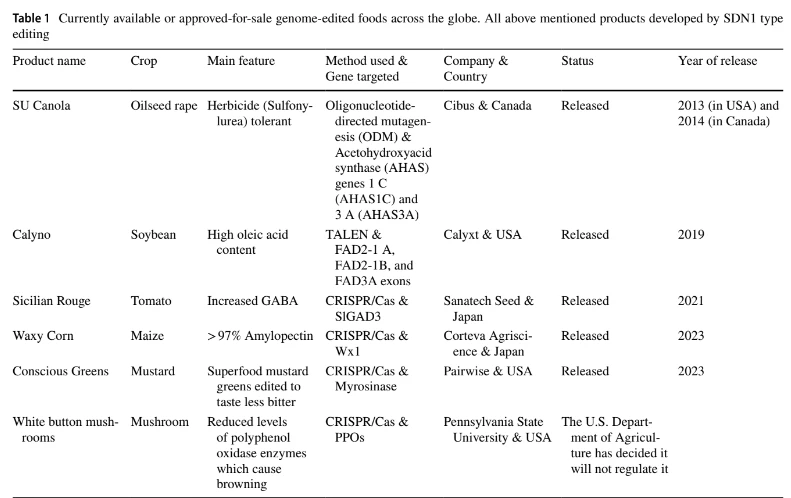Dozens of countries are planning to open their markets to agricultural gene editing. Here are the current regulatory status and opportunities for harmonization
Dozens of countries are planning to open their markets to agricultural gene editing. Here are the current regulatory status and opportunities for harmonization

Despite the absence of foreign genetic material in crops developed through CRISPR/Cas mediated genome editing, there is an ongoing and intense debate surrounding the regulation of these crops prior to their release into the market. While certain CRISPR-edited crops have already been introduced in Japan, their legal status remains a point of contention in several nations, including the EU and New Zealand. This review paper serves as a comprehensive guide to the worldwide regulatory framework for CRISPR-edited crops, as well as provide insights into the future prospects of this transformative technology. By examining the current landscape of regulations and exploring potential avenues for harmonization, we can better understand the challenges and opportunities that lie ahead for CRISPR-edited crops.
Up until now, CRISPR crops have managed to steer clear of the societal stigma and outright legal bans that GMO crops have encountered. Many countries have different regulatory standards for biosafety laws. It’s essential to differentiate CRISPR technology from earlier GMO technology. The open and unbiased debate is needed among scientists, governments, business interests, consumers, and media In order to create a special global regulatory framework for genome-edited crops.

This is an excerpt. Read the original post here
 | Videos | More... |

Video: Nuclear energy will destroy us? Global warming is an existential threat? Chemicals are massacring bees? Donate to the Green Industrial Complex!
 | Bees & Pollinators | More... |

GLP podcast: Science journalism is a mess. Here’s how to fix it

Mosquito massacre: Can we safely tackle malaria with a CRISPR gene drive?

Are we facing an ‘Insect Apocalypse’ caused by ‘intensive, industrial’ farming and agricultural chemicals? The media say yes; Science says ‘no’
 | Infographics | More... |

Infographic: Global regulatory and health research agencies on whether glyphosate causes cancer
 | GMO FAQs | More... |

Why is there controversy over GMO foods but not GMO drugs?

How are GMOs labeled around the world?

How does genetic engineering differ from conventional breeding?
 | GLP Profiles | More... |

Alex Jones: Right-wing conspiracy theorist stokes fear of GMOs, pesticides to sell ‘health supplements’





 Viewpoint — Fact checking MAHA mythmakers: How wellness influencers and RFK, Jr. undermine American science and health
Viewpoint — Fact checking MAHA mythmakers: How wellness influencers and RFK, Jr. undermine American science and health Viewpoint: Video — Big Solar is gobbling up productive agricultural land and hurting farmers yet providing little energy or sustainabilty gains
Viewpoint: Video — Big Solar is gobbling up productive agricultural land and hurting farmers yet providing little energy or sustainabilty gains Fighting deforestation with CO2: Biotechnology breakthrough creates sustainable palm oil alternative for cosmetics
Fighting deforestation with CO2: Biotechnology breakthrough creates sustainable palm oil alternative for cosmetics Trust issues: What happens when therapists use ChatGPT?
Trust issues: What happens when therapists use ChatGPT? California, Washington, Oregon forge immunization alliance to safeguard vaccine access against federal undermining
California, Washington, Oregon forge immunization alliance to safeguard vaccine access against federal undermining 30-year-old tomato line shows genetic resistance to devastating virus
30-year-old tomato line shows genetic resistance to devastating virus The free-range chicken dilemma: Better for birds, but with substantial costs
The free-range chicken dilemma: Better for birds, but with substantial costs ‘You have to treat the brain first’: Rethinking chronic pain with Sanjay Gupta
‘You have to treat the brain first’: Rethinking chronic pain with Sanjay Gupta
